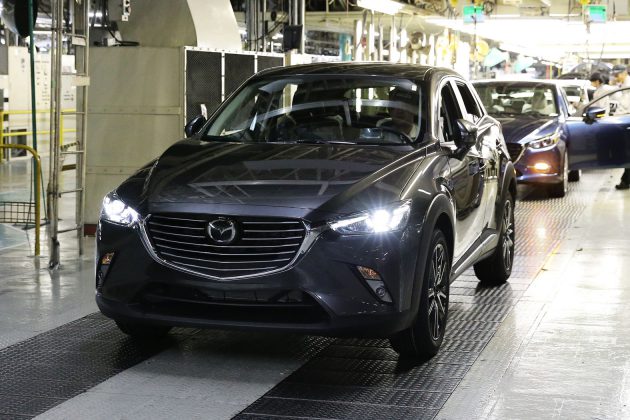Mazda Motor Corporation announced on 16 Dec that the company began production of the Mazda CX-3 subcompact crossover SUV on 15 Dec 2016 at Hofu Plant No.1 in Yamaguchi, Japan. The move strengthens the automaker’s supply system for SUV vehicles, demand for which continues to grow globally.

Hofu Plant becomes the third production facility to manufacture the CX-3, following Ujina Plant No.1 (in Hiroshima), where production began in December 2014, and AutoAlliance (Thailand) Co., Ltd., where production began in October last year.
Domestic production of the CX-3 has until now been confined to Ujina Plant No.1, which also produces the Mazda CX-5 and Mazda CX-9. Moving a portion of CX-3 production to Hofu enhances the company’s ability to supply these models and respond quickly and flexibly to growing demand for SUVs globally. Bringing CX-3 production online at Hofu went smoothly thanks to Mazda’s Bundled Product Planning*1 and Common Architecture Concept,*2 key components of the company’s Monotsukuri Innovation initiatives in product planning and production.
Mazda is aiming to create a flexible production system capable of producing up to 50 percent crossover vehicles as the company works to meet its global sales goal of 1.65 million units, as laid out in its Structural Reform Stage 2 medium-term business plan (covering the period from fiscal year ending (FYE) March 2017 through FYE March 2019).
“We’re aiming for a production system that gives us more flexibility in terms of plants and models, so we can get our cars to customers around the world as quickly as possible,” said Masatoshi Maruyama, Managing Executive Officer in charge of global production. “Achieving this will help create a stronger foundation for our business.”
Mazda will continue its efforts to enrich people’s lives through a variety of touchpoints, including high-quality vehicle production, and become a brand with which customers feel a strong emotional connection.
 FastMotoring Motor News In Speed
FastMotoring Motor News In Speed

